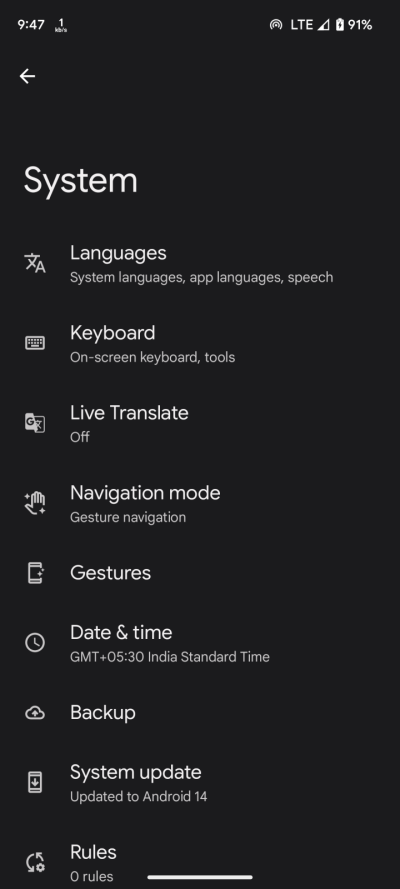Here is what's new in this release:
1. More sideloading restrictions in the name of security
2. Less battery drain with optimized background operations
3. A very low battery warning to prevent unexpected shutdowns
4. A much improved system share sheet
5. Lock screen customization
6. Redesigned back arrow for gesture navigation
7. The ability to check your battery health
8. A lava lamp effect in the media player
9. Ability to flash the flashlight for notifications!
10. Separate settings for the ringtone and notifications volume
11. Ultra HDR for your photos and videos
12. Material You-themed toggles in settings
13. A new mouse cursor
14. Many new keyboard shortcuts
15. A dedicated 2.4Ghz toggle for Wi-Fi hotspots
16. Health Connect is now a system app and moves previous users over
17. Small interface tweaks
18. Improved PIN security and convenience
19. New default profile images
20. A more delightful user switching animation
21. Improved image permission dialog
22. Support for dragging and dropping while switching apps
23. The clock shortcut in the notification shade makes a return
24. A new silent mode icon
25. A prominent charging indicator in the status bar
26. Languages and input settings are now split into two
27. Regional per-app preferences for date formats and more
28. Ability to view precisely what apps use your location for
29. Better accessibility thanks to bigger fonts and new hearing devices settings
30. Ability to tweak your font size on the go
31. A revamped contrast selector
32. AI generated wallpapers for users
33. Option to find out when your phone was manufactured
34. New gesture navigation tutorials
35. Better predictive back gestures
36. Options to let you force a transparent navigation bar
37. Better usability on big screens and cross-device use cases
38. A new Easter egg
Last but not least - Android is now even bigger a privacy nightmare with the inclusion of the Bard AI across the suite of products Google offers. Meta is also going to force AI in the encrypted private chat client 'WhatsApp'.
Additional resources for further reading:
- https://www.androidpolice.com/android-14/
- https://www.android.com/android-14/
- https://www.theverge.com/2023/10/4/23901594/google-pixel-android-14-ai-generated-wallpapers
1. More sideloading restrictions in the name of security
2. Less battery drain with optimized background operations
3. A very low battery warning to prevent unexpected shutdowns
4. A much improved system share sheet
5. Lock screen customization
6. Redesigned back arrow for gesture navigation
7. The ability to check your battery health
8. A lava lamp effect in the media player
9. Ability to flash the flashlight for notifications!
10. Separate settings for the ringtone and notifications volume
11. Ultra HDR for your photos and videos
12. Material You-themed toggles in settings
13. A new mouse cursor
14. Many new keyboard shortcuts
15. A dedicated 2.4Ghz toggle for Wi-Fi hotspots
16. Health Connect is now a system app and moves previous users over
17. Small interface tweaks
18. Improved PIN security and convenience
19. New default profile images
20. A more delightful user switching animation
21. Improved image permission dialog
22. Support for dragging and dropping while switching apps
23. The clock shortcut in the notification shade makes a return
24. A new silent mode icon
25. A prominent charging indicator in the status bar
26. Languages and input settings are now split into two
27. Regional per-app preferences for date formats and more
28. Ability to view precisely what apps use your location for
29. Better accessibility thanks to bigger fonts and new hearing devices settings
30. Ability to tweak your font size on the go
31. A revamped contrast selector
32. AI generated wallpapers for users
33. Option to find out when your phone was manufactured
34. New gesture navigation tutorials
35. Better predictive back gestures
36. Options to let you force a transparent navigation bar
37. Better usability on big screens and cross-device use cases
38. A new Easter egg
Last but not least - Android is now even bigger a privacy nightmare with the inclusion of the Bard AI across the suite of products Google offers. Meta is also going to force AI in the encrypted private chat client 'WhatsApp'.
Additional resources for further reading:
- https://www.androidpolice.com/android-14/
- https://www.android.com/android-14/
- https://www.theverge.com/2023/10/4/23901594/google-pixel-android-14-ai-generated-wallpapers
Last edited:








